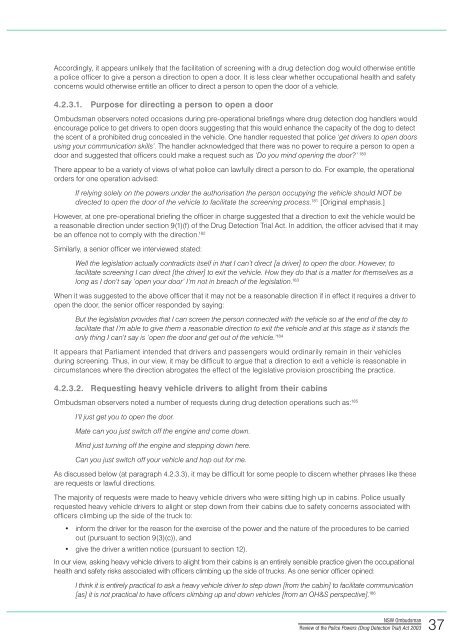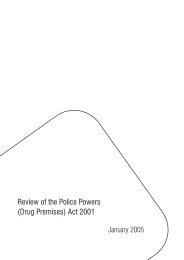Review of the Police Powers (Drug Detection Trial) Act 2003 - NSW ...
Review of the Police Powers (Drug Detection Trial) Act 2003 - NSW ...
Review of the Police Powers (Drug Detection Trial) Act 2003 - NSW ...
Create successful ePaper yourself
Turn your PDF publications into a flip-book with our unique Google optimized e-Paper software.
Accordingly, it appears unlikely that <strong>the</strong> facilitation <strong>of</strong> screening with a drug detection dog would o<strong>the</strong>rwise entitle<br />
a police <strong>of</strong>ficer to give a person a direction to open a door. It is less clear whe<strong>the</strong>r occupational health and safety<br />
concerns would o<strong>the</strong>rwise entitle an <strong>of</strong>ficer to direct a person to open <strong>the</strong> door <strong>of</strong> a vehicle.<br />
4.2.3.1. Purpose for directing a person to open a door<br />
Ombudsman observers noted occasions during pre-operational briefings where drug detection dog handlers would<br />
encourage police to get drivers to open doors suggesting that this would enhance <strong>the</strong> capacity <strong>of</strong> <strong>the</strong> dog to detect<br />
<strong>the</strong> scent <strong>of</strong> a prohibited drug concealed in <strong>the</strong> vehicle. One handler requested that police ‘get drivers to open doors<br />
using your communication skills’. The handler acknowledged that <strong>the</strong>re was no power to require a person to open a<br />
door and suggested that <strong>of</strong>ficers could make a request such as ‘Do you mind opening <strong>the</strong> door?’ 180<br />
There appear to be a variety <strong>of</strong> views <strong>of</strong> what police can lawfully direct a person to do. For example, <strong>the</strong> operational<br />
orders for one operation advised:<br />
If relying solely on <strong>the</strong> powers under <strong>the</strong> authorisation <strong>the</strong> person occupying <strong>the</strong> vehicle should NOT be<br />
directed to open <strong>the</strong> door <strong>of</strong> <strong>the</strong> vehicle to facilitate <strong>the</strong> screening process. 181 [Original emphasis.]<br />
However, at one pre-operational briefing <strong>the</strong> <strong>of</strong>ficer in charge suggested that a direction to exit <strong>the</strong> vehicle would be<br />
a reasonable direction under section 9(1)(f) <strong>of</strong> <strong>the</strong> <strong>Drug</strong> <strong>Detection</strong> <strong>Trial</strong> <strong>Act</strong>. In addition, <strong>the</strong> <strong>of</strong>ficer advised that it may<br />
be an <strong>of</strong>fence not to comply with <strong>the</strong> direction. 182<br />
Similarly, a senior <strong>of</strong>ficer we interviewed stated:<br />
Well <strong>the</strong> legislation actually contradicts itself in that I can’t direct [a driver] to open <strong>the</strong> door. However, to<br />
facilitate screening I can direct [<strong>the</strong> driver] to exit <strong>the</strong> vehicle. How <strong>the</strong>y do that is a matter for <strong>the</strong>mselves as a<br />
long as I don’t say ‘open your door’ I’m not in breach <strong>of</strong> <strong>the</strong> legislation. 183<br />
When it was suggested to <strong>the</strong> above <strong>of</strong>ficer that it may not be a reasonable direction if in effect it requires a driver to<br />
open <strong>the</strong> door, <strong>the</strong> senior <strong>of</strong>ficer responded by saying:<br />
But <strong>the</strong> legislation provides that I can screen <strong>the</strong> person connected with <strong>the</strong> vehicle so at <strong>the</strong> end <strong>of</strong> <strong>the</strong> day to<br />
facilitate that I’m able to give <strong>the</strong>m a reasonable direction to exit <strong>the</strong> vehicle and at this stage as it stands <strong>the</strong><br />
only thing I can’t say is ‘open <strong>the</strong> door and get out <strong>of</strong> <strong>the</strong> vehicle.’ 184<br />
It appears that Parliament intended that drivers and passengers would ordinarily remain in <strong>the</strong>ir vehicles<br />
during screening. Thus, in our view, it may be difficult to argue that a direction to exit a vehicle is reasonable in<br />
circumstances where <strong>the</strong> direction abrogates <strong>the</strong> effect <strong>of</strong> <strong>the</strong> legislative provision proscribing <strong>the</strong> practice.<br />
4.2.3.2. Requesting heavy vehicle drivers to alight from <strong>the</strong>ir cabins<br />
Ombudsman observers noted a number <strong>of</strong> requests during drug detection operations such as: 185<br />
I’ll just get you to open <strong>the</strong> door.<br />
Mate can you just switch <strong>of</strong>f <strong>the</strong> engine and come down.<br />
Mind just turning <strong>of</strong>f <strong>the</strong> engine and stepping down here.<br />
Can you just switch <strong>of</strong>f your vehicle and hop out for me.<br />
As discussed below (at paragraph 4.2.3.3), it may be difficult for some people to discern whe<strong>the</strong>r phrases like <strong>the</strong>se<br />
are requests or lawful directions.<br />
The majority <strong>of</strong> requests were made to heavy vehicle drivers who were sitting high up in cabins. <strong>Police</strong> usually<br />
requested heavy vehicle drivers to alight or step down from <strong>the</strong>ir cabins due to safety concerns associated with<br />
<strong>of</strong>ficers climbing up <strong>the</strong> side <strong>of</strong> <strong>the</strong> truck to:<br />
• inform <strong>the</strong> driver for <strong>the</strong> reason for <strong>the</strong> exercise <strong>of</strong> <strong>the</strong> power and <strong>the</strong> nature <strong>of</strong> <strong>the</strong> procedures to be carried<br />
out (pursuant to section 9(3)(c)), and<br />
• give <strong>the</strong> driver a written notice (pursuant to section 12).<br />
In our view, asking heavy vehicle drivers to alight from <strong>the</strong>ir cabins is an entirely sensible practice given <strong>the</strong> occupational<br />
health and safety risks associated with <strong>of</strong>ficers climbing up <strong>the</strong> side <strong>of</strong> trucks. As one senior <strong>of</strong>ficer opined:<br />
I think it is entirely practical to ask a heavy vehicle driver to step down [from <strong>the</strong> cabin] to facilitate communication<br />
[as] it is not practical to have <strong>of</strong>ficers climbing up and down vehicles [from an OH&S perspective]. 186<br />
<strong>NSW</strong> Ombudsman<br />
<strong>Review</strong> <strong>of</strong> <strong>the</strong> <strong>Police</strong> <strong>Powers</strong> (<strong>Drug</strong> <strong>Detection</strong> <strong>Trial</strong>) <strong>Act</strong> <strong>2003</strong><br />
37

















